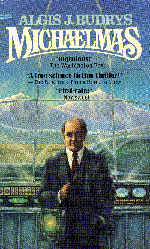|
Michaelmas
Copyright 1977 by
I first read this in 1979 and most recently on the 23rd January 2002 It is the early years of the 21st Century. Laurent Michaelmas is the top, most respected and most acclaimed reporter. He is urbane and civilised, he rubs shoulders with the rich and famous, and almost no door is closed to him. In his private life he is a isolated and lonely man, afraid of emotional entanglements and even perhaps a little paranoid. The United Nations Astronautics Commission has a major manned space mission scheduled to the outer planets. The mission is now to be commanded by the Russian astronaut, Papashvilly, due to the tragic death of the original commander Walter Norwood some months previously. When world-famous Professor Nils Limberg announces that the supposedly-long-dead Walter Norwood is in fact alive, having been restored from the brink of death by dint of the Professor's magnificent skill and astonishing medical techniques, the world is stunned. But Michaelmas realises that something is seriously wrong. He knows Norwood could not have survived his shuttle crash so who is lying? Who could gain from such lies? Moreover, Michaelmas is especially concerned because he believes that it is possible that this bizarre announcement may in some way be directed against him, to expose him, and to topple him. For Michaelmas has a secret. He believes he is more than a world-renowned journalist. Michaelmas believes that he rules the world, controlling it absolutely and guiding it in the path he has chosen. Wow. This has been one of my top-ten SF books since I first read it in a Science Fiction Book club edition picked up from a London used-book store. It is a tight, taught thriller packed full with wonderful ideas and it's beautifully written to boot. It's got everything I wanted in an SF novel: a great plot and a sense of wonder, of course, but also artificial intelligence, aliens, big guns (well, more correctly a Model Beta Peacekeeper military space plane), beautiful women, world-travel, a deeply cool hero (on whom, as is obvious to anyone who knows me, I have modelled myself) . To me this novel, or indeed the earlier novella, feels as though it was written some years before its copyright date of 1977. For example, what's this concern about radium? No-one bothered about radium in the '70s. On the other hand, with the novel's worldwide network of computers and the comment about the lack of awareness of good cryptoanalysis, it's quite a topical read, with its echoes of a benevolent Echelon. Oddly I have no recollection of particularly enjoying any other Algis Budris book, and I've read no others since, yet this book continues to astound me. Perhaps I should attempt to read some of his other works. Loaded on the 17th February 2002.
|
|




